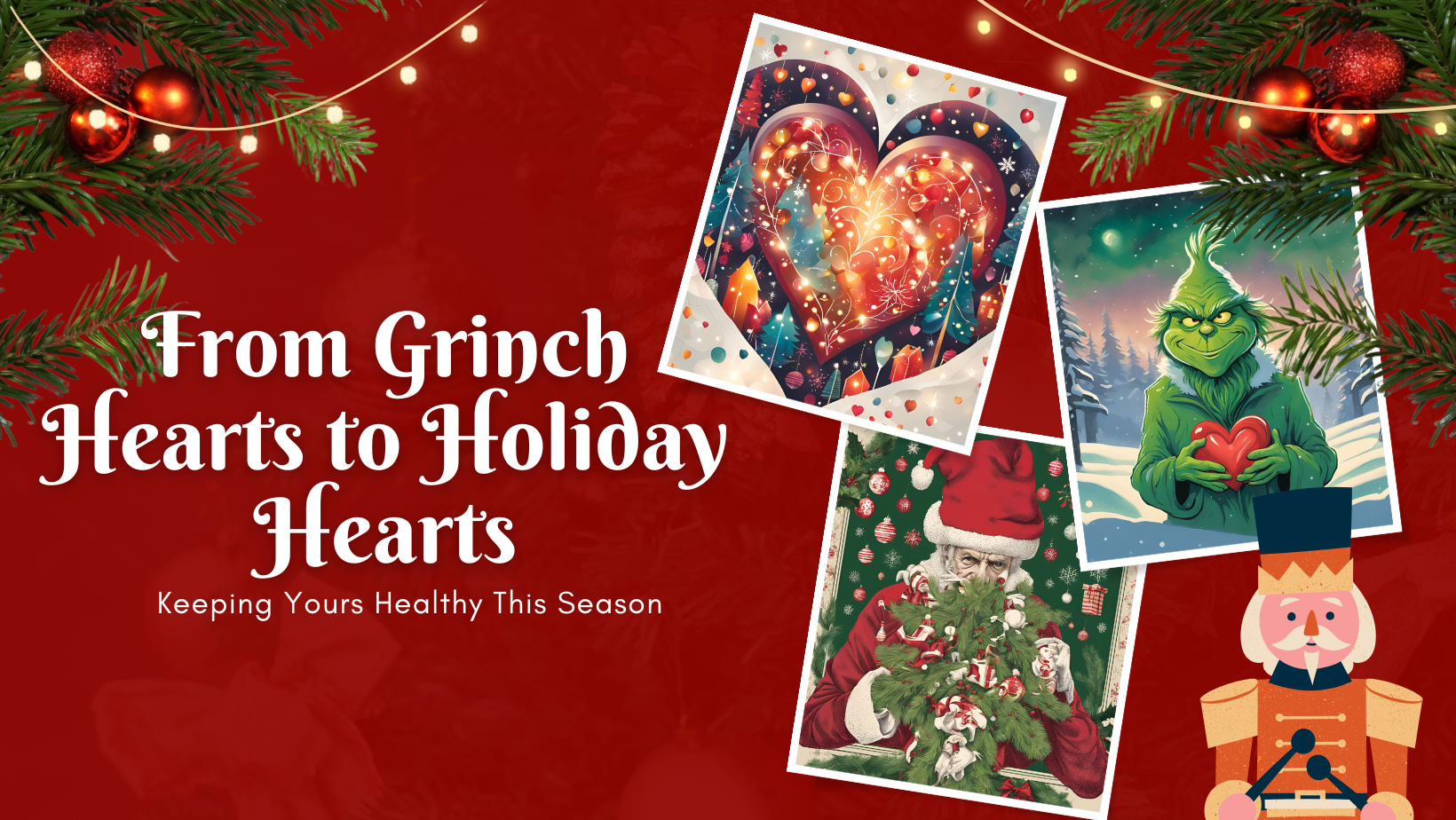From Grinch Hearts To Holiday Hearts:

Keeping Your Heart Healthy This Season
The holiday season is a time for caring, sharing, loving, and kindness. We are often overwhelmed with gratitude for our friends and family, feeling warm and fuzzy inside. Just thinking of the days to come can make our hearts “grow three sizes in one day”—metaphorically speaking, of course. Illness is not something we typically associate with the holidays, but it’s still present, even when disguised under festive names. Here are a few rare conditions you may not have known existed:
First, there’s Hemophilia B, also known as Christmas Disease, named after Stephen Christmas, the first person ever diagnosed with the condition in 1952. Hemophilia B is a rare genetic disorder that prevents blood from clotting properly due to a lack of the protein Factor IX.
Next, we have Nutcracker Syndrome, a vascular compression disorder in which a vein near the kidneys becomes pinched, causing a variety of symptoms. And, as an echo lab, we’d be remiss not to dive deeper into your heart health.
The Grinch is a Christmas classic by Dr. Seuss, and whether or not you’ve seen the movie or read the book, most people are familiar with the famous transformation at the end: “They say his heart grew three sizes that day.” In the context of holiday cheer, this sounds wonderful—more room for love! But, if we take this literally, the Grinch may have developed cardiomegaly, or enlarged heart syndrome. This condition is not a disease in itself, but rather a sign of other heart issues. When the heart is strained and forced to work harder than normal, such as due to high blood pressure, the extra stress causes the heart to grow, which can make it harder to pump blood effectively.
Cardiomegaly can be temporary or permanent, depending on the underlying condition. Possible causes include heart disease, cardiomyopathies, drug and alcohol use, arrhythmias, and even pregnancy. When the heart enlarges, the risk of heart failure and stroke increases. While this may sound frightening, cardiomegaly can often be managed. Once the cause is identified, a treatment plan can be developed, which may include dietary changes, increased exercise, smoking cessation, limiting alcohol use, and sometimes medications for blood pressure. In cases where the underlying cause is related to heart valves, surgery may be required.
On the flip side, there’s Postural Orthostatic Tachycardia Syndrome (POTS). This condition causes your heart rate to increase when transitioning from sitting or lying down to standing. Additional symptoms can include dizziness, fainting, palpitations, brain fog, anxiety, shortness of breath, chest pain, headaches, or fatigue. POTS is sometimes called “Grinch Syndrome” because it was once believed that patients with POTS had “small hearts,” similar to the Grinch’s heart before his transformation. While POTS is not typically life-threatening, it can significantly impact quality of life. Although the true cause remains unclear and there is no known cure, the main treatments focus on exercise and proper nutrition.
Finally, we come to Holiday Heart Syndrome (HHS). This term refers to a cardiac arrhythmia, often atrial fibrillation (AFib), that can occur after binge drinking—typically over a weekend or during the holidays. While long-term excessive drinking can negatively affect the heart, HHS can also affect people who don’t regularly drink but indulge during holiday celebrations. When experiencing AFib, symptoms may include fatigue, chest pain or pressure, dizziness, palpitations, and shortness of breath. Treatment varies based on the individual’s overall health, but in some cases, a cardioversion (low-energy shocks) may be necessary to restore normal heart rhythm.
To prevent Holiday Heart, it’s important to practice moderation. Limit excessive salt, binge drinking, and stress. Stay active during the holidays, and be cautious with medications, especially after drinking.
As we approach the holiday season, let’s remember that while it’s a time for celebration and joy, it’s also an opportunity to take care of our health and well-being. Stay mindful of your heart, stay active, and, most importantly, cherish the time with loved ones. Wishing you all a healthy and happy holiday season filled with warmth, love, and laughter!
Admin, UPMC. “3 Heart & Vascular Conditions You Don’t Want for Christmas | UPMC.” UPMC HealthBeat, 22 Dec. 2015, https://share.upmc.com/2015/12/3-heart-and-vascular- conditions-you-dont-want-for-christmas-this-year/. “What Is Hemophilia B (Christmas Disease)?” Healthline, 25 July 2012, https://www.healthline.com/health/hemophilia-b.
“Enlarged Heart.” Heart and Stroke Foundation of Canada, https://www.heartandstroke.ca/en/heart-disease/conditions/enlarged-heart/. Accessed 10 Dec. 2024. “What Is Cardiomegaly?: Symptoms, Causes, Diagnosis and Treatment.” MedPark Hospital, 19 Oct. 2022, http://www.medparkhospital.com/en-US/disease-and-treatment/what-is-cardiomegaly. Fu, Qi, et al. “Cardiac Origins of the Postural Orthostatic Tachycardia Syndrome.” Journal of the American College of Cardiology, vol. 55, no. 25, June 2010, pp. 2858–68. PubMed Central, https://doi.org/10.1016/j.jacc.2010.02.043. “POTS: Causes, Symptoms, Diagnosis & Treatment.” Cleveland Clinic, https://my.clevelandclinic.org/health/diseases/16560-postural-orthostatic-tachycardia-syndrome-pots. Accessed 10 Dec. 2024. Benisek, Alexandra. “Holiday Heart Syndrome: What to Know.” WebMD, https://www.webmd.com/heart-disease/atrial-fibrillation/holiday-heart-syndrome-what-to-know. Accessed 10 Dec. 2024. Jain, Anubhav, et al. “Holiday Heart Syndrome.” StatPearls, StatPearls Publishing, 2024. PubMed, http://www.ncbi.nlm.nih.gov/books/NBK537185/.
